Which is the Vietnamese national dish is a hard-to-answer question, as this country is home to so many appetizing foods. Below are the top 10 Vietnamese delicacies that tourists should not forget to try.
Vietnam is a famous destination in Asia for foodaholics. While people often think about “pho” and “banh mi” as the Vietnamese national dishes, this country has much more to offer. If you are seeking an unforgettable gastronomical experience, the following 10+ dishes are must-tries that you should not miss out on during your Vietnam travel.
1. Which food is widely recognized as the Vietnamese national dish?
1.1. Pho – the reputable Vietnamese national dish
What would a culinary tour be without Pho – the renowned Vietnamese national dish? Like the majority of well-known Vietnamese dishes, pho began in modest circumstances. There are still many unknowns regarding Pho’s history. Some claim that Pho was influenced by the French delicacy Pot-au-feu, while others insist the Chinese “Nguu Nhuc Phan” was the origin of this Vietnamese noodle soup.
Three unique pho cultures have emerged as a result of the turbulent history of Vietnam, including Pho Bac (in the North), Pho Hue (in the Central), and Pho Sai Gon (in the South). The most popular to tourists nowadays are the Hanoi and Saigon versions of Pho. If you have a chance to take a Saigon and Hanoi travel tour, do not forget to try both to see how different they are.
One of the best things about this Vietnamese national dish is that you can have it for any meal. Pho is suitable at any time of the day because it is inexpensive, wholesome, and easy to digest. Because the ingredients needed to make pho broth have therapeutic qualities, some even think that pho is a panacea.
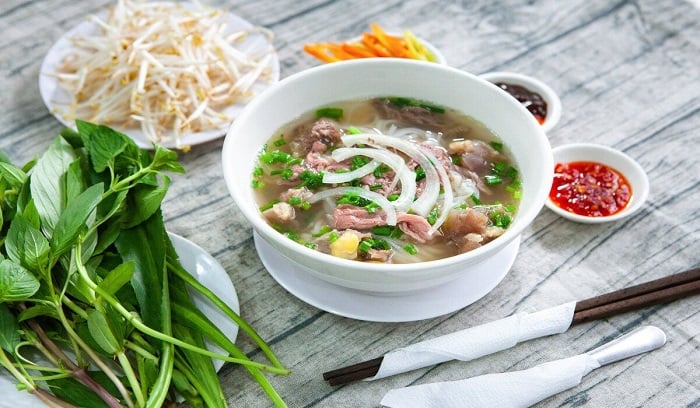 Pho – the worldwide famous Vietnamese national dish (Source: Collected)
Pho – the worldwide famous Vietnamese national dish (Source: Collected)
1.2. Chung Cake – the indispensable Vietnamese national dish during Tet
What is the national dish of Vietnam during holidays? Chung Cake undoubtedly. It is available all year long, especially during Tet when it appears on every altar and in every family gathering. This traditional Vietnamese steamed rice cake is covered in “dong” leaves and stuffed with sticky glutinous rice, umami-flavored fatty pork, and flavorful mung beans.
Making Chung Cake is one of the most interesting parts of preparation for Tet Holiday. The locals often wrap the cake between the 27th and 28th of the 12th lunar month, which is around 2-3 days before the New Year. Family members gather around the Chung Cake pot to chat the night out while waiting for the cake to be done.
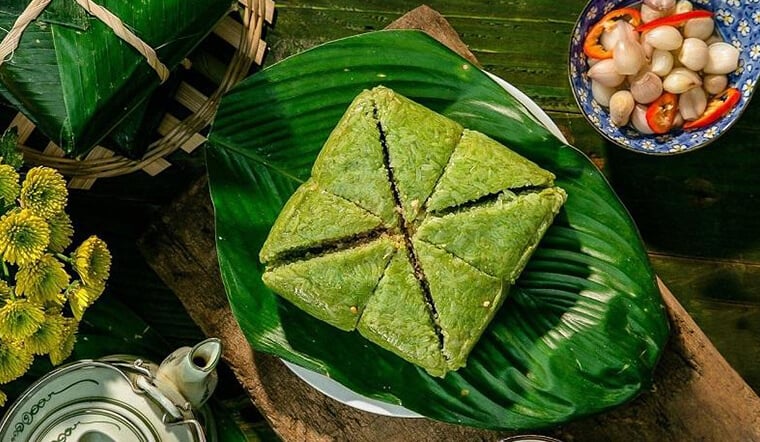 Chung Cake – an unmissable food during Tet Holiday (Source: Collected)
Chung Cake – an unmissable food during Tet Holiday (Source: Collected)
2. Other renowned Vietnam’s national dishes in the world’s culinary map
2.1. Pho rolls
The noodles of Pho not only appear in the worldwide famous Pho soup but are also used to make another mouth-watering dish – “pho cuon” (pho rolls or rolled pho). To make it, sheets of uncut pho noodles are used as a kind of wrapping paper for stir-fried beef, lettuce, onions, ginger, pepper, and herbs (mint, cilantro, etc.)
The rolls are served with a dipping sauce on the side, which is often a mixture of fish sauce, sugar, garlic, chili, and vinegar. Pho cuon is a dish that may be served as an appetizer or a snack and is particularly well-liked in the summer.
This dish is thought to have been created when a Hanoi street vendor ran out of broth for his Pho but still had some uncut noodles in his kitchen. With some meat and veggies left on the pan, the appetizing Pho rolls were born.
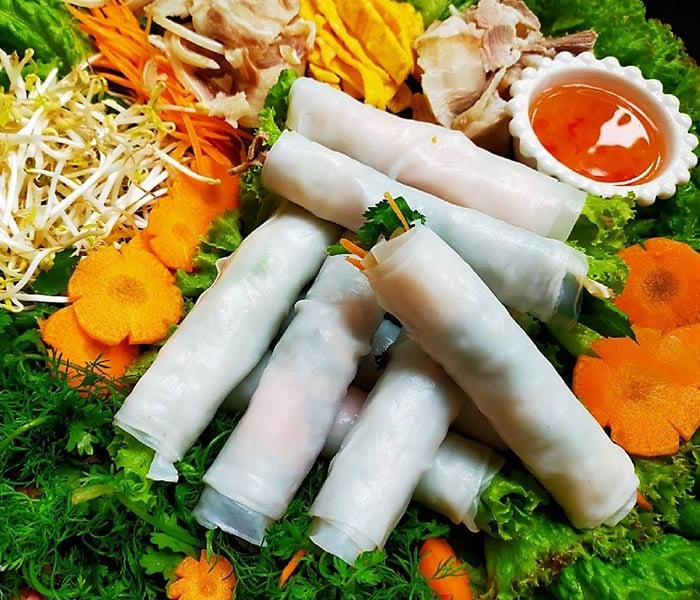 Pho cuon – a tasty food made of pho noodles (Source: Collected)
Pho cuon – a tasty food made of pho noodles (Source: Collected)
2.2. Banh mi – a popular Vietnamese food
Banh mi is another Vietnamese national dish that is famous worldwide. Banh mi is the name for a wide variety of Vietnamese sandwiches that all have a baguette as the main component, which was brought to Vietnam during the colonial era. The crispy bread, sauces, and meats are all products of French and Chinese colonialism while cilantro, chili, and pickles reflect the local preference for fresh veggies and vibrant flavors.
The early banh mi was made with bread, meat, and seasonings; no additional vegetables were included. Today, the options are essentially endless. Cold cuts, pate, butter, mayonnaise, cucumbers, cilantro, pickles, etc. are commonly used to make banh mi. A good Vietnamese bread should have a delicate crust, supple, chewy fillings, and a heavenly tasty flavor. The fact that most of the fillings and condiments are unfamiliar to foreigners may be the reason for the huge appeal of this national Vietnamese food.
The most famous variations of banh mi are banh mi Hanoi, banh mi Hoi An, banh mi Hue, and banh mi Saigon.
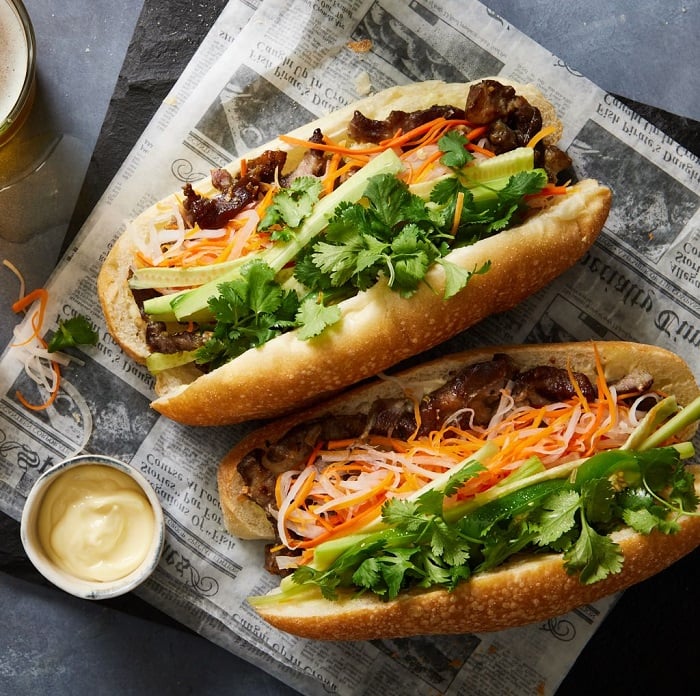 Banh Mi is another reputable Vietnamese national dish (Source: Collected)
Banh Mi is another reputable Vietnamese national dish (Source: Collected)
2.3. Vietnamese noodles – the most famous Vietnamese national dish
Noodles are a crucial part of Vietnam’s culinary culture and there are ways too many scrumptious dishes associated with Vietnamese noodles. This Vietnam’s national dish is not just about Pho but also about a wide variety of noodle soups such as “bun”, “mien”, “banh canh”, “hu tieu”, etc. With such diversity, there is no wonder why Vietnamese food is one of the best.
The majority of Vietnamese noodles are made from rice, which is abundant in the paddy fields that dot the nation. The shapes and recipes of Vietnamese noodles are varied. The noodles might be flat or round, white or brown. It can be served in a bowl of hot broth, mixed with herbs, or stir-fried with some meat and veggies.
Vietnamese people eat noodles at any time of the day, either for breakfast, lunch, dinner, or even late-night meals. Some people might prepare the noodles themselves at home, but the majority prefer sitting at roadside food stalls or eateries to enjoy this mouth-watering Vietnamese national dish while chatting with friends.
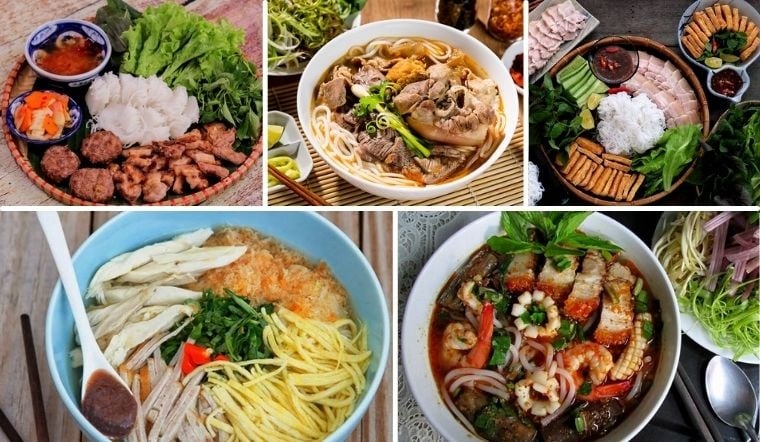 A variety of noodle dishes in Vietnam (Source: Collected)
A variety of noodle dishes in Vietnam (Source: Collected)
2.4. Spring rolls
Vietnamese spring rolls are known under 2 different names: “nem ran” in the North and “cha gio” in the South. The pork and shrimp fillings, which are wrapped in thin rice paper, are what sets these delectable rolls apart.
Carrots, mushrooms, “mien” (Vietnamese glass noodles), and coriander are frequently added as fillings, also. The rolls are speedily fried to deliver a scrumptious delicacy with a visually attractive golden color, a thin, crispy exterior, and savory fillings.
The most typical spring roll is made with ground pork and minced shrimp, but there are variations that might even include tofu or crab. This Vietnamese national dish can serve as either an appetizer or a main course. It frequently goes with lettuce, fresh cucumbers, fish sauce or sweet and sour sauce.
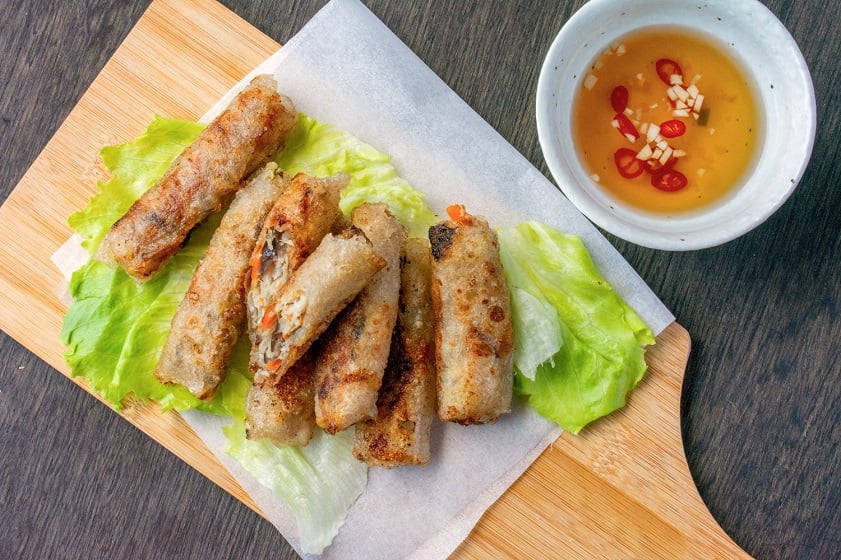 “Cha gio” – a must-try in any Vietnam food tour (Source: Collected)
“Cha gio” – a must-try in any Vietnam food tour (Source: Collected)
2.5. Egg coffee – highlight the coffee culture of Vietnam
If there is a drink that deserves to be a Vietnamese national dish, it is definitely Vietnamese egg coffee. It was developed in the 1940s by Mr. Giang, a bartender at Sofitel Legend Metropole Hanoi Hotel, to temper the robust flavor of the traditional Vietnamese black coffee. He created “Egg Coffee” by mixing coffee with a mixture of egg yolks and condensed milk. A thick, creamy mayonnaise-like mixture is made by whisking together the egg yolks and milk. After that, it is spilled over the black coffee to create the delightful Egg Coffee.
Nothing beats sitting down in a little cafe tucked away in one of the Old Quarter’s back alleys and sipping a hot egg coffee on a chilly winter day. In Hanoi, Giang Cafe, founded by Mr. Giang himself, is the best spot to try egg coffee. Several coffeehouses in the Old Quarter, such as Dinh Cafe, Lam Cafe, or Loading T, serve this beverage as well. Each shop has its own recipe, thus the flavor may be slightly different, yet always worth a try.
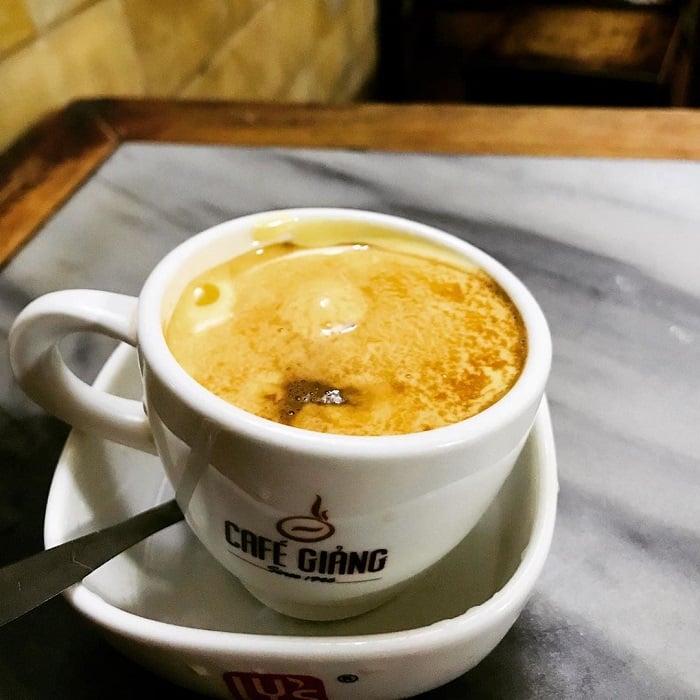 Egg coffee – the signature drink of Hanoians (Source: Collected)
Egg coffee – the signature drink of Hanoians (Source: Collected)
2.6. Broken rice – Southern Vietnamese national dish
Regarding the Vietnamese national dish in the South, “com tam” (Vietnamese broken rice) is a must-mention. The broken rice grains that used to be discarded following the milling process have now become a signature dish of the Saigon people.
The texture of broken rice is similar to that of regular rice but smaller. When served, it is topped with a variety of ingredients, such as grilled pork chops, omelets, shredded pork rinds, and fish patties. Lime wedges, chopped spring onions, and mint are common garnishes. Sliced cucumbers and tomatoes, pickles, and dipping sauces are typical side dishes.
 A “com tam” stall in Southern Vietnam (Source: Collected)
A “com tam” stall in Southern Vietnam (Source: Collected)
2.7. Pancakes
“Banh xeo”, or pancake Vietnam, is a popular street food that deserves to be named in the list of Vietnamese national dishes. Crunchy crepes are combined with a wide selection of flavorful ingredients to make this appetizing pancake. Rice flour is used to make the thick, yellow batter for the pancake. Other ingredients for the batter include water, turmeric, coconut milk, or coconut cream.
Other ingredients, including cubed pork, shrimp, bean sprouts, and onions, are sautéed before being added to the pan. In order to keep the fillings nestled inside the pancake, banh xeo is pan-fried on low heat before being delicately folded in half.
Vietnamese sizzling pancakes are often served with vegetables like lettuce, carrots, and cucumber, herbs like mint and cilantro, and a dipping sauce created by fish sauce, lime, sugar, pepper, and garlic. Banh xeo is then cut into smaller pieces, wrapped in lettuce or rice paper, and enjoyed by hand.
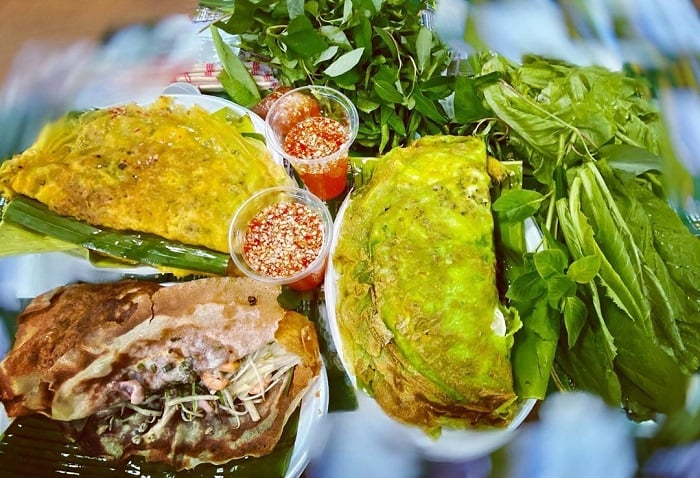 Vietnamese sizzling pancakes (Source: Collected)
Vietnamese sizzling pancakes (Source: Collected)
2.8. Steamed rice rolls
Banh cuon is one of the most popular foods to eat for breakfast in Vietnam. This Vietnamese steamed rice roll is loaded with either pork, mushroom, or both. Banh cuon is often served with a bowl of sweet and sour fish sauce topped with fried shallots and a wide selection of fresh herbs.
The preparation of these steamed rolls, which must always be thin and delicate, requires extraordinary skills. This Vietnamese national dish is often served hot and is a regular morning dish to warm up your bellies to start a new day.
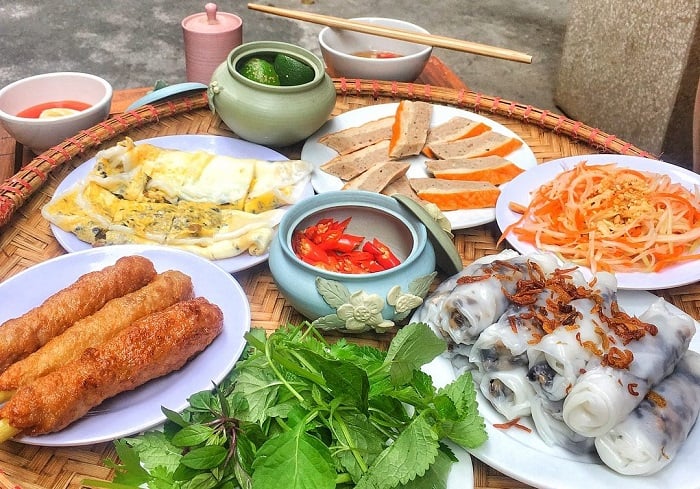 Banh cuon Thanh Tri – one of the most famous Vietnamese steamed rice rolls (Source: Collected)
Banh cuon Thanh Tri – one of the most famous Vietnamese steamed rice rolls (Source: Collected)
2.9. Quang noodles – A famous Vietnamese food in the Central region
If pho is the pride of Hanoians, Mi Quang, or Quang noodles, is the signature dish of Hoi An cuisine. This traditional Central Vietnamese national dish contains flat rice noodles and exceptionally fresh vegetables and herbs, such as lettuce, cilantro, coriander, and scallion. It is served with a modest amount of savory meat broth.
The dish’s many toppings typically include pork belly, frog, chicken, shrimp, eggs, roasted peanuts, and sesame rice crackers. It is a must-try that travelers should not miss out on when they visit Da Nang and Hoi An Ancient Town.
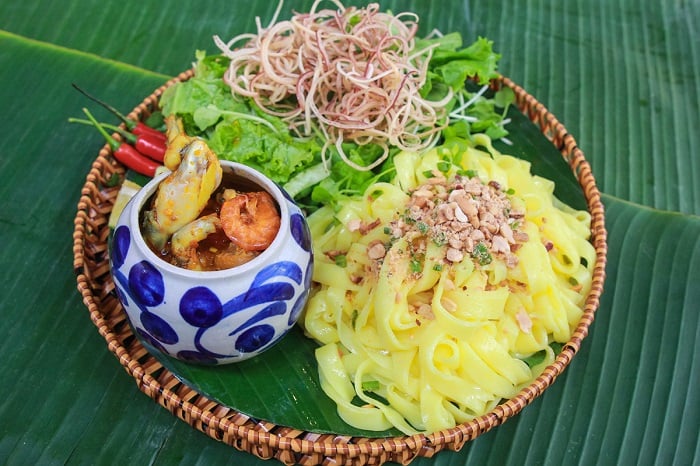 Mi quang ech (Quang noodles with frog) (Source: Collected)
Mi quang ech (Quang noodles with frog) (Source: Collected)
2.10. Bun dau mam tom
Bun dau mam tom is the last to mention in this list of popular Vietnamese food, yet it is no less impressive than other dishes. The must-have ingredients of this toothsome dish are rice vermicelli noodles, fried tofu, and most significantly, “mam tom” (fermented shrimp paste).
Each component is served separately, accompanied by a generous amount of fresh green herbs. Slices of boiled pork, “cha com” (green sticky rice patties), and “doi sun” (fried pork cartilage sausages) are commonly added to the dish. Before being served, the shrimp paste is often drizzled with some drops of lemon or kumquat juice.
Bun dau mam tom is more popular in the North than in the South, particularly well-liked in Hanoi. This distinctive Vietnamese national dish is a street food that is offered by several street vendors and food stalls. It also appears on some big restaurants’ menus, too.
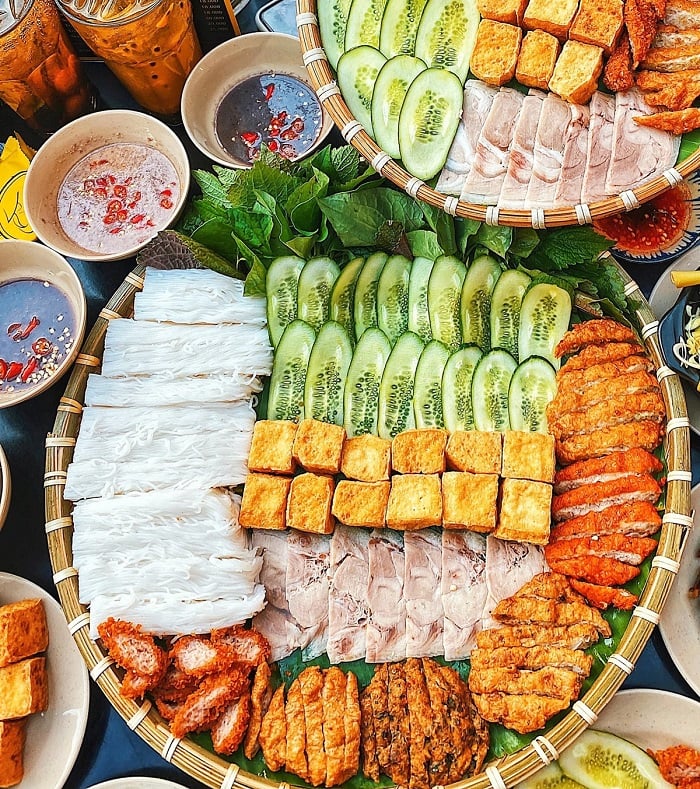 A tray of bun dau mam tom (Source: Collected)Aside from trying the superb Vietnamese national dishes, there are many other fascinating things to do in Vietnam, such as admiring the beauty of nature, learning about the local culture and Vietnamese language, or trying a lot of fantastic indoor and outdoor activities.
A tray of bun dau mam tom (Source: Collected)Aside from trying the superb Vietnamese national dishes, there are many other fascinating things to do in Vietnam, such as admiring the beauty of nature, learning about the local culture and Vietnamese language, or trying a lot of fantastic indoor and outdoor activities.
 A luxurious beach resort of Vinpearl in VietnamIn addition to finding the best destinations to visit and the best foods to eat, choosing the right accommodation is also essential when planning a Vietnam trip. If you are looking for a good place to stay in Vietnam, consider the system of Vinpearl hotels and resorts. It is the country’s leading accommodation brand with a wide range of lodging options in most Vietnam famous tourist destinations, namely:
A luxurious beach resort of Vinpearl in VietnamIn addition to finding the best destinations to visit and the best foods to eat, choosing the right accommodation is also essential when planning a Vietnam trip. If you are looking for a good place to stay in Vietnam, consider the system of Vinpearl hotels and resorts. It is the country’s leading accommodation brand with a wide range of lodging options in most Vietnam famous tourist destinations, namely:
- Vinpearl Phu Quoc: nestled along the pristine coastline of Phu Quoc, Vinpearl Phu Quoc delivers an outstanding vacation experience with top-notch accommodations and services. Located nearby are Vinpearl Safari and VinWonders Phu Quoc theme park.
- Vinpearl Nha Trang: situated in Nha Trang, Vinpearl Nha Trang offers guests an opulent vacation experience with a wide selection of facilities and attractions, namely amusement complexes, golf courses, and water parks.
- Vinpearl Hoi An: it is the ideal getaway for those looking for a peaceful and enjoyable retreat near Hoi An thanks to its top-notch amenities, first-rate services, and splendid settings.
- Vinpearl Resort & Spa Da Nang: it is the perfect spot for a luxurious and soothing holiday, as it is furnished with first-rate amenities and provides guests with a breathtaking view of Non Nuoc Beach, Da Nang.
- Vinpearl Resort & Spa Ha Long: nestled on an undisturbed island in Ha Long, this resort offers a breathtaking ocean view, spacious lodging, a variety of culinary options, and a range of recreational opportunities for an enjoyable beach escape.
>>> Book rooms in Vinpearl Phu Quoc, Vinpearl Nha Trang, Vinpearl Hoi An, Vinpearl Resort & Spa Da Nang, Vinpearl Resort & Spa Ha Long for a cozy and comfortable stay in Vietnam!
Vietnamese cuisine is one of the most intriguing aspects of this country. It is dynamic, complicated, and never monotonous. Don’t forget to try the distinctive Vietnamese national dishes while you are in this beautiful country!
>>> Book rooms in Vinpearl Phu Quoc, Vinpearl Nha Trang, Vinpearl Hoi An, Vinpearl Resort & Spa Da Nang, Vinpearl Resort & Spa Ha Long to enjoy flawless nights in Vietnam!
>>> Book voucher, combo, tour to Phu Quoc, Nha Trang, Hoi An, Da Nang to plan your travel with ease!

0 Comment